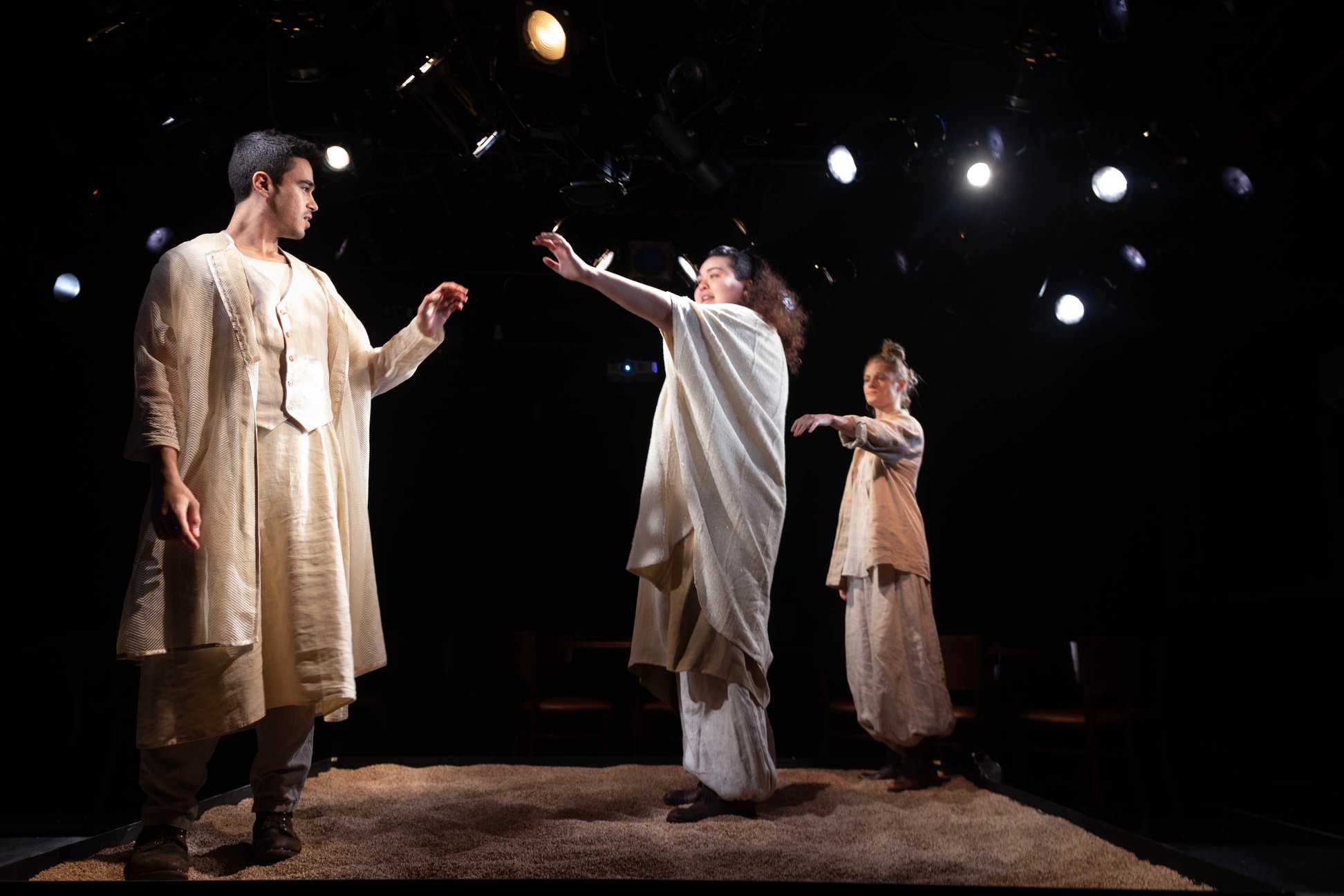Review of Agreste (Drylands), Yale Cabaret
Brazilian author Newton Moreno’s Agreste (Drylands) features propulsive storytelling. As translated by Elizabeth Jackson and directed by Danilo Gambini at Yale Cabaret, the play, a narrative about two characters and a community, is told by three actors who narrate and mime events in a rhythmic round. By turns lyrical, funny, surprising, tragic, Agreste (Drylands) achieves folkloric power. This is the kind of tale that would live on in the minds of locals, a defining act of bloodletting that makes us confront the fate that outsiders and outliers too often find in communities that fearfully maintain a baleful conformity.
The three actors—Abubaker Mohamed Ali, Rachel Kenney, Ilia Isorelýs Paulino—are abetted by the show’s careful design. They act inside what looks like a large sandbox to signify the drylands—or “agreste” region of Brazil—where two mostly inarticulate persons meet regularly at a fence that divides them, the way that wall divided Pyramus and Thisbe. Eventually, the woman, a fresh-faced innocent (most often enacted by Kenney), finds a hole through the fence. The hole is a widening spot of light, very effectively realized at key moments in the story. The two leave behind their own land and journey over the drylands to the ocean where they nearly lose themselves until a motherly woman takes them to a nearby community. There, the lovers build a shack and begin a life together.
Akubakr Mohamed Ali, Ilia Isorelýs Paulino, Rachel Kenney in Agreste (Drylands) at Yale Cabaret, directed by Danilo Gambini
This is a story of a fated love, a consuming passion that isn’t necessarily physical in its main emotion. The lovers gaze at one another and in that togetherness don’t need to do anything else or be anywhere else. Living together for decades, they are treated as husband and wife. They plan to marry officially and have finally gotten together all the trappings needed for the ceremony when the man (Abubakr Mohamed Ali) dies suddenly and unexpectedly.
Even more unexpected—but not unheard of by the parish priest (Ali) who comes to investigate the situation—is the fact that the old women of the community who come to help the widow lay out the body find no sign of “a willie” on the deceased. This scene, in which all three cast members enact a conclave of voices commenting on and joking about male genitalia, is both very funny and vicious. We see how, as beings of flesh, we are all vulnerable to a materialist reading. The widow tells how she and her husband coupled always in the dark, through a sheet, and that she has no knowledge of male anatomy. Her husband is, to her, the only man she has ever known and the loss of his dignity, as a naked body she has never seen, laid out on a table, is appalling enough. The loss of his status as a man and husband is devastating.
But that’s not devastating enough for this community. Thus the presence of the priest who chides her for “the commotion” she has created by letting the old gossips have access to her secret. Now there’s no way the priest can bury the body as a man, as he might’ve done otherwise. This aspect of the play is key to what unfolds. The authority here—the church—can turn a blind eye when it deems it best but it can’t risk its standing in the community by openly contradicting the ethos—such as it is—of the consensus. And the consensus is that the couple is an outrage and an abomination. It ends with the inevitability one finds in tales of the early Christians, a death for the sake of a persecuted love, an agape that, in promising paradise, asserts that its proper sphere is beyond this life on earth. Song—such as Paulino’s wholly captivating rendering of “His Eye is on the Sparrow”—helps this aspect of the tale find its emotional tone.
The cast performs with great precision the ins-and-outs of the round-robin style of presentation, each stepping forward to give shadings of feeling, whether through narrative or dialogue or singing. Kenney presents a young woman captured by what she believes to be male beauty, and Ali enacts well both the mystery of her husband and the sympathetic but ultimately callous priest. In her Cabaret debut, Paulino’s characterizations have a lightness that helps with the somewhat homespun elements of the tale while her room-filling a capella vocals express both rapture and agony. The songs chosen, like the southern U.S. drawl of the sheriff (Ali) and of the townsfolk at one point, take us out of the Brazilian setting, but that only makes the story more immediate to the deep social dysfunction of our own time and place in America.
With its ensemble presentation, the play is simply fascinating to watch, its story seeming to be spun from the air around us. Use of the material of the “sandbox” is effective too, and Yaara Bar’s always magical projections create here a key manifestation of beauty. The costumes, by April M. Hickman, are lovely, suggesting a desert culture with great aesthetic sense. We feel the culture’s presence behind the story, a collectivity that must somehow atone for the wrong done but which also—as with other stories of tragic endings at communal hands—finds a shared identity in the sacrifice of a scapegoat.
Agreste (Drylands)
Translated by Elizabeth Jackson
Directed by Danilo Gambini
Producer: Jaime F. Totti; Set Designers: Alexander McCargar and Sarah Karl; Costume Designers: April M. Hickman; Lighting Designer: Nic Vincent; Sound Designer: Emily Duncan Wilson; Projections Designer: Yaara Bar; Technical Director: Martin Montaner V.; Dramaturg: Maria Inês Marques; Stage Manager: Cate Worthington
Cast: Abubakr Mohamed Ali, Rachel Kenney, Ilia Isorelýs Paulino
Yale Cabaret
October 25-27, 2018
